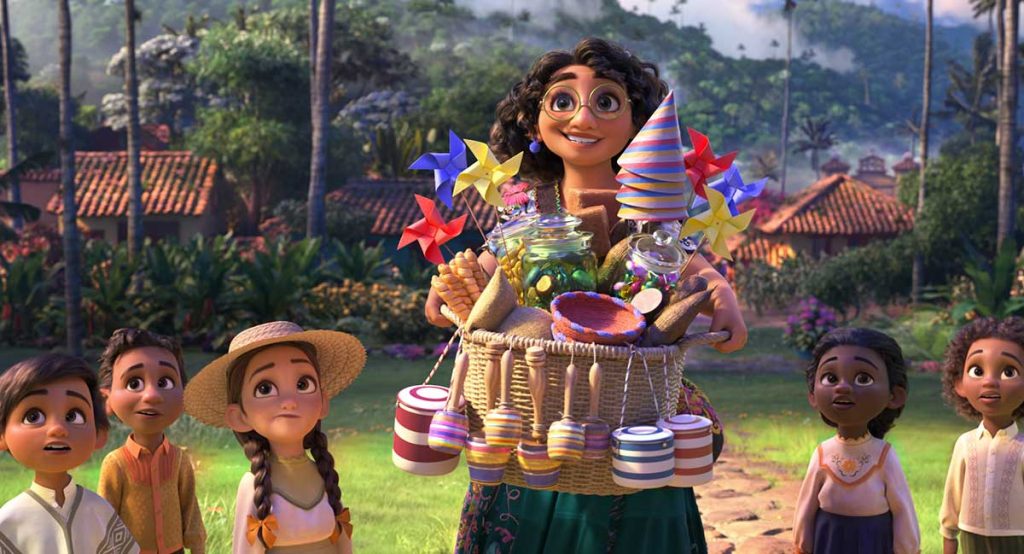Disney’s latest animated movie Encanto may be a familiar tale, but in presentation it is a visual treat and an infectious delight.
Lin-Manuel Miranda is having quite a year. With four major feature length releases over the past six months alone, he seems determined to never let his name fade from the public consciousness for even a moment since Hamilton propelled him into household status. Audience fatigue of his particular fusion of rap and musical theater is an imminent worry, but if Encanto is any indication he won’t be slowing down anytime soon. With Disney’s ubiquitous intellectual properties dominating the box office, it’s refreshing that the studio’s animation department remains the highlight of their output. Encanto may be a relatively familiar tale, but in presentation it is an infectious delight and a feast for the senses.
Encanto tells the story of a family who live hidden in the mountains of Columbia in a magical house that bestows each child with a unique gift. Given that it is about an entire extended family, the movie is more communally focused than other Disney princess films, but it manages to seamlessly balance its ensemble narrative around a clear lead protagonist. Mirabel (Stephanie Beatriz) is the only member of her family who was not gifted with any supernatural abilities, and so she often feels like a disappointment to her Abuela (María Cecilia Botero) and gets left out of (or in the way of) her cousins’ activities. On the anniversary night celebrating the family’s plentiful fortune, Mirabel begins to notice signs that indicate the magic is faltering, and she takes it upon herself to restore her family to their full glory.
From the enthusiastic opening, the movie is constantly in motion. The house itself has a personality, constructing entire settings, entire ecosystems before our very eyes, transforming its walls and transporting us to endless magical destinations. Disney has always been the world’s leading animators, and Encanto is yet another demonstration of their technical ability. There is depth of field in the computer generated imagery, expressive shadows and lighting; there is texture not just to the images, but to the very elements they inhabit. You can practically feel the rushing wind, the raging tides, the glowing warmth inside the home. There is a buoyant quality to the animation, a lively effervescence emanating from even the inanimate surroundings.

Although the Madrigal family is not technically royalty, Encanto is still unmistakably a princess movie, covering the usual themes of destiny and self-actualization. However, Encanto continues in Moana‘s more progressive path, centering around a more fully realized and individual female protagonist. The movie is completely about Mirabel and her family, with no romantic “prince charming” subplot to distract from her own personal journey. She both metaphorically and quite literally grows from a powerless little girl into an empowered young woman, conquering her demons all on her own.
But that isn’t the whole story, only Mirabel’s portion. As mentioned, while the film is focused around Mirabel’s personal journey, it is an ensemble movie, and the purpose of her quest is for the family. The quest she goes on successfully restores the magic, of course, and everyone lives happily ever after, of course, but it never was about the destination. Her mission to save the magic is initially for selfish reasons, to prove that she is just as special as the more special people that surround her, just as vital to her family despite being normal. Along the way, she learns that she had been so focused on trying to be like everyone else that she never really wondered if everyone else was actually happy being themselves.
In a movie full of rousing musical numbers, Luisa’s (Jessica Darrow) is by far the most moving. Luisa’s gift is that she’s strong—very strong—and throughout the first half of the film we witness her cheery disposition as she carries several donkeys on her shoulders with ease, or moves an entire house with a single finger. But when Mirabel confronts her about her fears regarding the dissipating family magic, Luisa breaks out into song, opening up about her own insecurities. Luisa, perceived as an impenetrable force of sheer strength because of her physical gift, is actually a big, strong, loveable, vulnerable woman. In this moment the entire movie flips our perception: without externally endowed superpowers, Mirabel is really the only one who is truly free to blaze her own trail and forge her own destiny. Following in the trend of Disney’s more recent princess movies (Tangled, Frozen, Moana), Encanto completely subverts the entire philosophy of fulfilling one’s destiny; the mission Mirabel accomplished was in eliminating the idea of such destiny, and the “happily ever after” she and the Madrigal family ultimately find is one that allows them all to define for themselves who they are, and who they want to be.
Encanto is an imaginative fantasy with a big heart bursting from its every dazzling frame. It radiates a positive energy, pairing familiarity with a compelling array of unique characters, lively settings, and a fun central conceit. Mirabel is a protagonist that many children will be able to see themselves in, and learn something about who they are like only the movies could ever teach. It is one thing to make a movie about magic, but Encanto manages to itself be magical.
Encanto is now showing in theaters everywhere.

